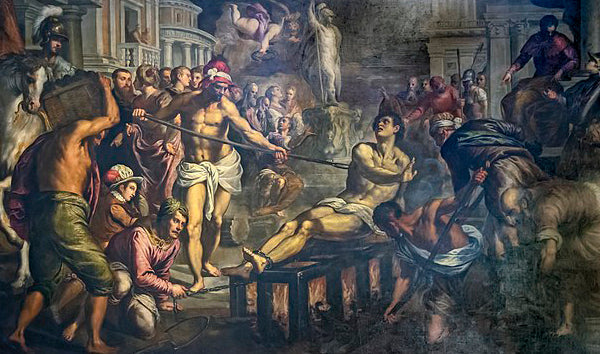This was a very interesting, historical article. Thank you.

Saint Lawrence - On Fire for Christ
|
|
|
|
Saint Lawrence made his legacy as one of the most prolific Roman martyrs in history. His sacrifice was a result of his zeal and his recognition of Christ in the poor and destitute. He is famous for his diaconate and how he was executed: over a flame on a grill.
Table of contents
Seven deacons served the faithful in The Church in Rome. One of them, Lawrence (also known as Laurence) took his service to the Church very seriously. As the executioners drug Pope Sixtus away, Lawrence wept and wondered out loud what the Pontiff would do without “his deacon.” Pope Sixtus reassured Lawrence that the deacon would see him again, after death in three days. The elated Lawrence gathered up all the money, gold, and silver. He distributed the proceeds to the poor, but these transactions caught the attention of the Evil Emperor Valerian.
The dubious ruler of the Roman Empire heard of Lawrence’s generosity to the “lowest of the low.” Greed began to cloud his judgment. He approached Lawrence and told him to forfeit the Church’s monetary fortune with the blasphemous request “Please render onto Ceasar what belongs to Ceasar.” Saint Lawrence made an appeal to the Emperor and had three days to gather the “treasures of the church.” The faithful deacon saw the value in the humanity of the poor, the cripple, the leper, and anyone who was destitute. He gathered a very large number of people together and presented them to Emperor Valerian as the “treasures of the Church.” This did not amuse the “Ceasar” at all.
Incensed by what he perceived to be Lawrence’s disobedience, Emperor Valerian sentenced the deacon to death. Wanting the disobedient deacon to “die by inches” in a slow-gruesome way, the emperor chose his instrument of death carefully. Soon, a smoldering hot gridiron sat over red coals. Lawrence now knew the cause of his earthly demise. Once upon the grill, witnesses to his martyrdom observed his joyfulness, the glow on his face, and his apparent lack of physical pain. Lawrence smiled and uttered the words that earned him the title “Patron Saint of Humor.”
“Let my body be turned; one side is broiled enough.” The executioner honored his request and broiled the “other side.” Lawrence continued: “It is cooked enough, you may eat.”
Moments before Saint Lawrence commended his spirit to the Lord, he fervently prayed for the conversion of Rome and that the City would propagate the faith of Christ throughout the world.
The Roman-Christian poet Prudentius credits Lawrence’s dying prayer with the complete conversion of Rome. God began to grant the Deacon’s request the second it was made. Several senators witnessed Lawrence’s heroics and converted to Christianity on the spot. They took Lawrence’s body and gave it a proper burial. The always poetic Prudentius declared that Lawrence’s death was also the death of Idolatry in Rome. The government that once persecuted the Christians they killed now venerates their graves. Saint Lawrence became one of the most venerated Martyrs of the Church since his entrance into heaven.
Source: christianapostles.com
Comments
This was a very interesting, historical article. Thank you.


